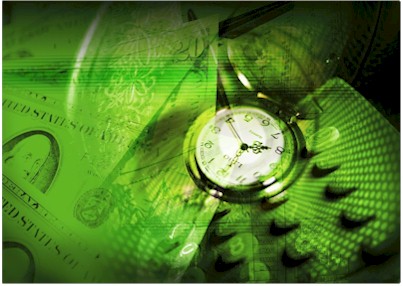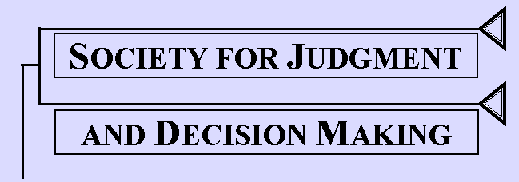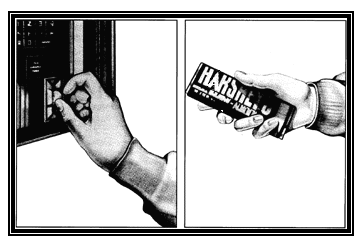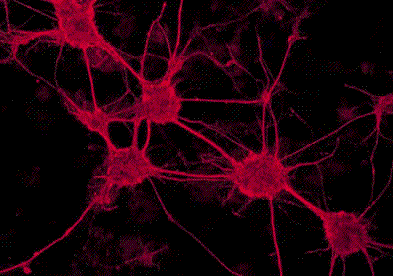« March 2005 | Main | May 2005 »
April 27, 2005
Time is Money
TIME IS MONEY: TIME PRESSURE, INCENTIVES, AND THE QUALITY OF DECISION-MAKING

Do time pressure and time-dependent incentive schemes have an influence on the quality of decision-making in economics and finance? A recent discussion paper on strategic interaction out of the Max Planck Institute (series) investigates the effects of time pressure on the quality of economically relevant decision-making. In particular, the article address two research questions: (i) Is there a tradeoff between the quality of decision-making and time pressure? (ii) How do time-dependent incentive schemes affect the (possible) trade-off between the quality of decision-making and time pressure?
ABSTRACT:
"Many decisions in economics and finance have to be made under severe time pressure. Furthermore, payoffs frequently depend on the speed of decision-making, like, for instance, when buying and selling stocks. In this paper, we examine the influence of time pressure and time-dependent incentive schemes on the quality of decision-making in an experimental beauty-contest game. We find that convergence to equilibrium is faster and payoffs are higher under low time pressure than under high time pressure. Interestingly, time-dependent payoffs under high time pressure lead to significantly quicker decision-making without reducing the quality of decisions."
QUOTES:
"Investment decisions – like trading stocks – are the prime example for the relevance of time pressure and time-dependent incentive schemes. Watching the floors of the New York Stock Exchange, for instance, convinces even the layman that trading is, typically, prone to severe time pressure, yielding the conclusion that there is not much time to decide in order to make money in some instances. But, more than that, time is money, because profits from trading (both for the principal investor and the agent trader) may depend crucially on the speed of the trader’s reaction to relevant new information…"
"Finally, consumers – the main decision-making agents in economics – often have to make decisions under time pressure. Think, for instance, of shopping a few minutes before shops close or participating in an auction. Some companies seem to be willing to exploit the existence of time pressure as part of their sales strategy by offering special discount prices for a typically rather narrow time period. Shopping TV-channels, like Home Shopping Europe (HSE), provide another example for deliberately inducing time pressure. When selling products with a limited number of available items (or at least, when the impression of scarcity of items is intended), the number of sold or still available items is updated and shown on the TV-screen after each purchase, thereby pushing consumers to make a quick decision if they are interested in the product..."
"Psychology offers several explanations for a negative influence of time pressure on the quality of decision-making. Time pressure induces subjects to rely more heavily on heuristics or so-called rules of thumb for decision-making in complex environments.6 It has long been established that such heuristics – even in the absence of time press - frequently result in systematic decision-making errors (Tversky and Kahneman, 1974; Wickens and Holland, 2000). Time pressure adds to the pitfalls of heuristics, because it prevents a thorough (and time-consuming) check of the internal logic of decisions and its consistency with the expected behavior of other subjects and because it induces subjects to focus on the most salient cues when making a decision, even if these cues are of no importance for the decision to be made (Wallsten and Barton, 1982). Besides affecting actual decisions, time pressure has also an influence on the willingness to gather information and process it before even making a decision. This phenomenon is known as ‘closing of the mind’ (Kruglanski and Freund, 1983), meaning that people seek cognitive closure and stop considering multiple alternatives..."
"Our results suggest that convergence to the game-theoretic equilibrium is faster and payoffs are higher with a very weak time constraint (practically no time pressure), compared to a situation where subjects face a rather tight time constraint of only 15 seconds to decide. Hence, time pressure has a negative effect on the quality of decisions and on subjects’ performance. Our time-dependent incentive scheme in case of time pressure induces significantly quicker decision-making and, on average, even improves the quality of decision-making instead of reducing it, even though the latter effect is not statistically significant. We suspect that the time-dependent incentive scheme induces a shift in the effort levels exerted by subjects that offsets the negative effect of the decrease in decision-making time on the decision’s quality. The opportunity to gain considerably higher payoffs seems to trigger higher concentration or effort levels. Hence, our results suggest that if decisions have to be taken under severe time pressure, the use of time-dependent monetary incentives should be considered as an appropriate means to speed up decision making significantly without generally deteriorating decision-making quality..."
ABOUT THE AUTHORS:
Martin G. Kocher is an Assistant Professor in the Department of Economics, Institute of Public Finance, University of Innsbruck, Austria. Homepage
Matthias Sutter is Professor of Economics, Max Planck Institute for Research into Economic Systems, Strategic Interaction Group. Homepage
Posted by DSN at 10:16 AM | Comments (0) | TrackBack
April 25, 2005
The Society for Judgment and Decision Making Call for Abstracts
2005 ANNUAL MEETING OF THE SOCIETY FOR JUDGMENT AND DECISION MAKING CALL FOR ABSTRACTS:

The Society for Judgment and Decision Making (SJDM) invites abstracts for symposia, oral presentations, and posters on any interesting topic related to judgment and decision-making. Completed manuscripts are not required.
LOCATION, DATES, AND PROGRAM:
SJDM's annual conference will be held at the Sheraton Centre in Toronto, ON, Canada, from November 12-14, 2005. As in 2004, we’ve added a full day (Saturday) to the schedule to make room for more presentations and for two keynote speakers:
Keynote speaker #1: Michael Posner, Professor Emeritus of Psychology, University of Oregon, and author of many path-breaking articles on neural mechanisms and structures underlying selective attention.
Keynote speaker #2: Xg4k%h Sh8&v@!, Due to heightened security, we cannot provide the name of the second keynote speaker at this point.
SUBMISSIONS:
The deadline for submissions is July 15, 2005.
Submissions for symposia, oral presentations, and posters should be made through the SJDM website at http://sql.sjdm.org. Technical questions can be addressed to the Webmaster, Alan Schwartz, at www@sjdm.org. All other questions can be addressed to Judy Lin, at judylin@mit.edu.
ELIGIBILITY:
At least one author of each presentation must be a member of SJDM. Joining at the time of submission will satisfy this requirement. A membership form may be downloaded from the SJDM website at http:/ www.sjdm.org. An individual may give only one talk (podium presentation) and present only one poster, but may be a co-author on multiple talks and/or posters.
AWARDS:
The Best Student Poster Award is given for the best poster presentation whose first author is a student member of SJDM.
The Jane Beattie Travel Memorial Scholarship subsidizes travel to the United States for scholarly pursuits related to JDM research, including attendance of the annual meeting. Further details regarding these awards are available at http://www.sjdm.org.
PROGRAM COMMITTEE:
Craig Fox (institutional memory)
Dan Ariely (program chair)
Derek Koehler (conference coordinator)
Ellen Peters (speaker coordinator)
George Wu (poster chair)
Posted by DSN at 08:17 PM | Comments (0) | TrackBack
April 17, 2005
What is Behavioral Economics?
BEHAVIORAL ECONOMICS:

"Behavioral economics [applies] scientific research on human and social cognitive and emotional [patterns] to better understand economic decisions and how they affect market prices, returns and the allocation of resources. The fields are primarily concerned with the rationality, or lack thereof, of economic agents. Behavioral models typically integrate insights from psychology with neo-classical economic theory... Behavioral analyses are mostly concerned with the effects of market decisions, but also those of public choice...
At the outset behavioral economics […] theories were developed almost exclusively from experimental observations and survey responses, though in more recent times real world data has taken a more prominent position. fMRI has also been used to determine which areas of the brain are active during various steps of economic decision making. Experiments simulating market situations such as stock market trading and auctions are seen as particularly useful as they can be used to isolate the effect of a particular [heuristic] upon behavior; observed market behavior can typically be explained in a number of ways, carefully designed experiments can help narrow the range of plausible explanations. Experiments are designed to be incentive compatible, with binding transactions involving real money [as] the norm. " (from Wikipedia)
BEHAVIORAL ECONOMICS ARTICLES:
*Save More Tomorrow: Using Behavioral Economics to Increase Employee Saving by Richard H. Thaler; University of Chicago and NBER and Shlomo Benartzi; UCLA Anderson
*Behavioral Economics by Sendhil Mullainathan; MIT and NBER and Richard H. Thaler; University of Chicago and NBER
*Behavioral Economics and Institutional Innovation by Robert J. Shiller; Yale University
*Amos Tversky and the Ascent of Behavioral Economics by David Laibson; Harvard University and Richard Zeckhauser; Harvard University
Posted by DSN at 05:15 PM | Comments (0) | TrackBack
April 10, 2005
What is Neuroeconomics?
NEUROECONOMICS:

Neuroeconomics is a multidisciplinary research field incorporating neuroscience, economics, and psychology aimed at developing an understanding of how we make choices. It looks at the brain when we evaluate decisions, categorize risks and rewards, and when we interact with others. (from Wikipedia)
"Neuroeconomics is an interdisciplinary research program with the goal of building a biological model of decision making in economic environments. Neuroeconomists ask, how does the embodied brain enable the mind (or groups of minds) to make economic decisions? By combining techniques from cognitive neuroscience and experimental economics we can now watch neural activity in real time, observe how this activity depends on the economic environment, and test hypotheses about how the emergent mind makes economic decisions. Neuroeconomics allows us to better understand both the wide range of heterogeneity in human behavior, and the role of institutions as ordered extensions of our minds." (from the Neuroeconomics Explained post from professor Kevin McCabe's Weblog)
RECENT NEUROECONOMICS ARTICLES:
* From The New York Times: Brain Experts Now Follow the Money:
"People are efficient, rational beings who tirelessly act in their own self-interest. They make financial decisions based on reason, not emotion. And naturally, most save money for that proverbial rainy day. Right?... Well, no. In making financial decisions, people are regularly influenced by gut feelings and intuitions. They cooperate with total strangers, gamble away the family paycheck and squander their savings on investments touted by known liars...
Such human frailties may seem far too complicated and unpredictable to fold into economic equations. But now many neuroscientists are beginning to argue that it is time to create a new field of study, called neuroeconomics...
To explore economic decision-making, researchers are scanning the brains of people as they engage in a variety of games designed by experimental economists. The exercises are intended to make people anticipate what others will do or what others will infer from the person's own actions. These researchers are busy scanning the brains of people as they make economic decisions, barter, compete, cooperate, defect, punish, engage in auctions, gamble and calculate their next economic moves. Based on their understanding of how fluctuations in neurons and brain chemicals drive those behaviors, the neuroscientists are expressing their findings in differential equations and other mathematical language beloved by economists...
The brain needs a way to compare and evaluate objects, people, events, memories, internal states and the perceived needs of others so that it can make choices. It does so by assigning relative value to everything that happens. But instead of dollars and cents, the brain relies on the firing rates of a number of neurotransmitters — the chemicals, like dopamine, that transmit nerve impulses. Novelty, money, cocaine, a delicious meal and a beautiful face all activate dopamine circuits to varying degrees; exactly how much dopamine an individual generates in response to a particular reward is calibrated by past experience and by one's own biological makeup."
* From Business Week: Why Does logic often takes a backseat in making decisons?: This question may suggest that the study of neuroeconomics may topple the notion of rational decision-making.
"The National Hockey League and its players wrangle over a salary cap. The impasse causes the season to be canceled. Everybody loses. What went wrong?
According to the new science of neuroeconomics, the explanation might lie inside the brains of the negotiators. Not in the prefrontal cortex, where people rationally weigh pros and cons, but deep inside, where powerful emotions arise. Brain scans show that when people feel they're being treated unfairly, a small area called the anterior insula lights up, engendering the same disgust that people get from, say, smelling a skunk. That overwhelms the deliberations of the prefrontal cortex. With primitive brain functions so powerful, it's no wonder that economic transactions often go awry. "In some ways, modern economic life for humans is like a monkey driving a car," says Colin F. Camerer, an economist at California Institute of Technology."
* From The Princeton Weekly Bulletin: Take it or Leave It: Brain imaging study reveals interplay of thought and emotion in economic decisions. By Steven Schultz
* From PLoS Biology: A Neuroeconomics Approach to Inferring Utility Functions in Sensorimotor Control:
Economists use the concept of a utility function, which increases with increasing desirability of the outcome, to characterize human decision-making about physical movement.
* From Science: Separate Neural Systems Value Immediate and Delayed Monetary rewards: by Samuel McClure, David Laibson, George Loewenstein and Jonathan Cohen. Are the two birds in the bush a better choice than the one in your hand?
*From Science: The Involvement of the Orbitofrontal Cortex in the experience of regret: Neural responses associated with regret in gambling tasks.
Posted by DSN at 06:21 PM | Comments (0) | TrackBack
April 05, 2005
Postdoc at Columbia
POST-DOCTORAL RESEARCHER – CENTER FOR RESEARCH ON ENVIRONMENTAL DECISIONS, COLUMBIA UNIVERSITY

The Center for Research on Environmental Decisions (CRED) at Columbia University is seeking an outstanding researcher for a one-year post-doctoral position to start in the Fall of 2005, renewable for a second year. The post-doc will carry out research and coordinate lab activities.
CRED is directed by Professors Elke Weber, David Krantz, Roberta Miller, and Kenny Broad and includes researchers from psychology, management, economics, engineering, climate science, anthropology, and history. CRED studies individual and group decision making under climate uncertainty and, more broadly, decision making in the face of environmental risk. While research is conducted both in the lab and in various countries around the world, the post-doc will be responsible for lab projects. For more information please visit www.cred.columbia.edu.
Qualifications: Candidates must have a Ph.D. in a discipline relevant to decision making. May 2005 graduates will be considered for the position. Applicants should be interested in applied research that is ultimately aimed at improving stakeholders’ decision making. Being highly organized is a must; being comfortable running a Linux Web server and having other excellent computer skills would be a definite advantage.
To apply, please send a CV, two letters of recommendation, one writing sample, and a cover letter describing your research interests and expertise carrying out experimental research. Review of applications will begin mid-April and continue until the position is filled.
Applications should be sent to:
Sabine Marx, sm2234 (a) columbia DOT edu
Sabine Marx, Associate Director
Center for Research on Environmental Decisions (CRED)
Columbia University
406 Schermerhorn Hall
1190 Amsterdam Ave
New York, NY 10027
Columbia University is an Affirmative Action/Equal Opportunity Employer.
Posted by dggoldst at 06:08 PM | Comments (0) | TrackBack
April 01, 2005
Two jobs in de Nederlands
ASSISTANT PROFESSORSHIP AT TILBURG UNIVERSITY, THE NETHERLANDS

FACULTY OF SOCIAL SCIENCES
Tilburg University is a modern, specialized university. The teaching and research of the Faculty of the Social Sciences are organized around the themes of Health, Organization, and Relations between State, Citizen, and Society. The faculty’s inspiring working environment challenges its workers to realize their ambitions; involvement and cooperation are essential to achieve this.
DEPARTMENT OF PSYCHOLOGY AND SOCIETY / SOCIAL PSYCHOLOGY GROUP
The teaching and research at the Department of Psychology and Society focus on the influence of the social environment on the behaviour of individuals. This theme is approached from economic, organizational, social, and cultural perspectives. At present, the social psychology group are David de Cremer, Eric Igou, Thijs Poppe, Marcel Zeelenberg, and 7 PhD-students. Currently we are looking for a colleague for the position of: ASSISTANT PROFESSOR IN SOCIAL/ECONOMIC PSYCHOLOGY (M/F), 1,0 fte, TENURE TRACK POSITION, vacancy number: 400.05.01
JOB DESCRIPTION
As an Assistant Professor (lecturer) you will teach in our Bsc and Msc programs and in our graduate program, and you will supervise students at all levels (in internal and external research projects). Your teaching will be primarily in the area of consumer behavior, behavioral decision making and economic psychology. You will do basic research and have some administrative duties. We are looking for a strong candidate with interests in consumer/economic psychology, individual and social decision-making, and/or the psychology of emotion.
JOB REQUIREMENTS
The ideal candidate has a Ph.D. in psychology or decision sciences and experience with experimental and/or applied research. He or she has a proven record of research in one of the fields mentioned above and is committed to excellence of teaching. Moreover, the candidate is ambitious, able to work independently but willing to cooperate with the colleagues in the social psychology group. Excellent communicative skills are indispensable for this position.
TERMS OF EMPLOYMENT
Tilburg University belongs to the top of the best employers of the Netherlands and is known for her good terms of employment. The salary will be determined according to the job ranking system of the University (in Dutch: universitair functie-ordenen UFO). You will be offered a contract for a period of 4 years. After 4 years a tenure position is possible, depending on your job performance.
INFORMATION AND APPLICATION
You can find more information about the University of Tilburg and the Department of Psychology and Society on: www.tilburguniversity.nl. You can also contact prof. dr. Marcel Zeelenberg (tel.+31-13-466 8276 or m.zeelenberg at uvt dot nl). Your application, accompanied by a CV, a statement of research and teaching interests, one or more published
or unpublished papers, and the names of at least three references, can be sent until April 15, 2005 to: M.J. Bassie, Managing Director of the Faculty of Social and Behavioural Sciences, Postbus 90153, 5000 LE, Tilburg or pz-fsw@uvt.nl (indicating the vacancy number 400.05.01).
FULL PROFESSOR OF MARKETING; Vrije Universiteit Amsterdam
The Vrije Universiteit Amsterdam, The Netherlands, invites applications for the position of a Full (tenured) Professor of Marketing in the Department of Marketing at the Faculty of Economics and Business Administration.
THE VRIJE UNIVERSITEIT AMSTERDAM
Amsterdam, the capital of the Netherlands, has been a renowned cultural, scientific and commercial center for many centuries. It was here, in 1880, that the Vrije Universiteit first opened its doors to students. The VU (www.vu.nl) aims to be inspiring, innovative and involved. It now comprises twelve faculties and has teaching facilities for 17,000 students. The university campus and university hospital are situated in the south-western part of Amsterdam, one of the most dynamic and fast-growing business districts in the Netherlands. The international airport of Schiphol-Amsterdam is just 8 minutes away by train. Both the research and the educational programs of the Vrije Universiteit are of a high quality (the work of different research groups have been evaluated to be of world class; the educational programs of Economics and Business Administration have been rated by students among the best in the country).
THE MARKETING DEPARTMENT
The Department of Marketing is a young, ambitious and expanding group oriented towards the international marketing community. Currently, the Department has about 10 faculty members, 5 adjunct faculty and 4 Ph.D. students. Although the Department hosts different specialization areas within Marketing, we focus particularly on Marketing Strategy. The Department is committed to creating a stimulating working environment. We strive for high quality in both research and educational programs. We offer a broad scope of marketing courses, including a full-time Master of Science in Marketing program (fully in English). Our research program especially focuses on topics within the area of marketing strategy, such as innovation and customer relationships. For more information, see: www.feweb.vu.nl/marketing
THE CANDIDATE
The Department of Marketing seeks to further strengthen its position. We are therefore looking for candidates with a Ph.D. in Marketing or related areas and who are enthusiastic about contributing to the ambitious goals of the Department. Especially, we seek a candidate who is committed to excellence in both research and education. This should be visible from the candidate’s high quality past performance, such as an international research profile and good teaching evaluations. Both applicants with demonstrable potential for high quality research as well as senior candidates with high quality past performance are welcome to reflect. Given the specialization area of the Marketing department, we favor candidates who are especially interested in strategic issues in marketing. Also, applicants should have a positive attitude towards inspiring junior faculty members and cooperation in joint research projects. The teaching load will be limited. Senior faculty members will share the administrative tasks. Candidates do not need to have knowledge of the Dutch language (passive knowledge of the language after 2 years is required), but should be fluent in English.
INFORMATION/APPLICATION
We offer a stimulating working environment with many opportunities for growth and new initiatives. Salaries are negotiable and include additional benefits.
For information, please contact Ruud Frambach, Chair of the MarketingDepartment (see for contact details below). Candidates who are interested to apply for this position are requested to send a detailed resume containing educational data, a list of publications, teaching experience and evaluations, administrative experience as well as any other information that may be relevant for the position to the address below. Applications can be submitted by regular or electronic mail to:
Prof. dr. Ruud T. Frambach, Chair
Department of Marketing
Vrije Universiteit Amsterdam
Faculty of Economics and Business Administration
De Boelelaan 1105
1081 HV Amsterdam
The Netherlands
Phone: +31 20 598 6002
Fax: +31 20 598 6005
Email: rframbach at feweb.vu.nl
Posted by dggoldst at 12:00 AM | Comments (0) | TrackBack